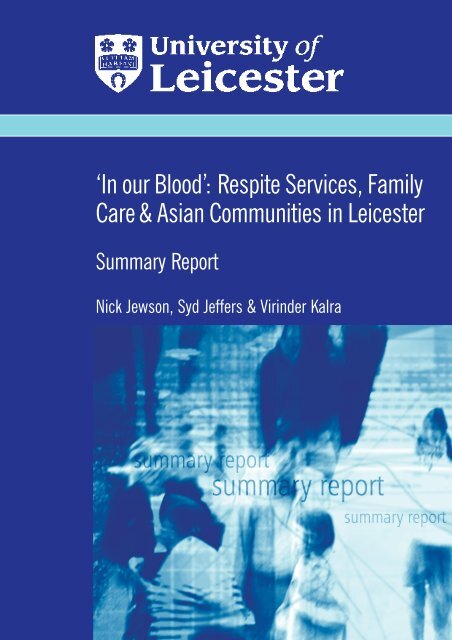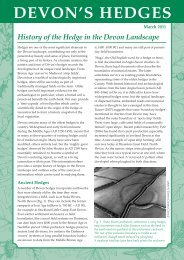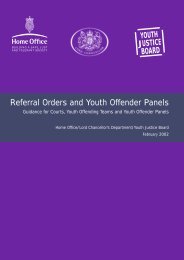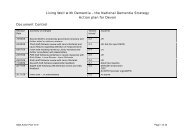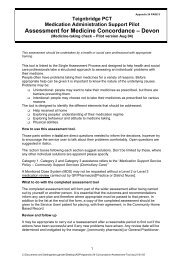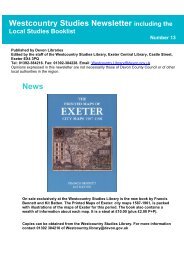In our Blood - Devon County Council
In our Blood - Devon County Council
In our Blood - Devon County Council
Create successful ePaper yourself
Turn your PDF publications into a flip-book with our unique Google optimized e-Paper software.
‘<strong>In</strong> <strong>our</strong> <strong>Blood</strong>’: Respite Services, Family<br />
Care & Asian Communities in Leicester<br />
Summary Report<br />
Nick Jewson, Syd Jeffers & Virinder Kalra
Summary Report<br />
Nick Jewson<br />
Syd Jeffers<br />
Virinder Kalra<br />
Department of Sociology<br />
University of Leicester<br />
Leicester LE1 7RH<br />
© University of Leicester 2003<br />
2 University of Leicester
‘<strong>In</strong> <strong>our</strong> <strong>Blood</strong>’: Respite Services, Family Care & Asian Communities in Leicester<br />
‘<strong>In</strong> <strong>our</strong> <strong>Blood</strong>’: Respite Services, Family<br />
Care & Asian Communities in Leicester<br />
Summary Report<br />
<strong>In</strong>troduction<br />
This Summary Report outlines the findings of a research study of the use of respite care<br />
services by Asian carers and elders in the city of Leicester. The study explores attitudes<br />
towards respite care within the context of Asian family relationships more generally. An<br />
extended version of the analysis briefly presented here is to be found in the Full Report,<br />
which comprises nine chapters totalling 125K words. The full report can be downloaded at<br />
. Text versions of the full report can also be<br />
obtained from the authors.<br />
The Nature of Respite Care<br />
Respite care encompasses a wide range of formal social and health care services, provided<br />
in order to support and sustain carers in maintaining their informal caring responsibilities.<br />
Respite care services are often said to fall into three broad types: short-term residential<br />
stays, day care, and services in the home. However, the defining characteristic of respite<br />
care lies not in the kind of services provided but the reasons for which they are offered.<br />
Respite services are intended to:<br />
provide carers with temporary breaks from the pressures of caring responsibilities;<br />
address the needs of carers whilst facilitating the continuation of care relationships;<br />
refresh and reinvigorate carers without disrupting their caring roles.<br />
Respite care, thus, supports carers but, by so doing, benefits elders too.<br />
Research Funding<br />
The research project was commissioned by Ethnic Elders and supported by funding from<br />
Leicestershire Social Services and Leicestershire Health Authority.<br />
University of Leicester 3
Summary Report<br />
Research Methodology<br />
The study was conducted between 1999 and 2001. Hindu, Muslim, Sikh and white<br />
Christian carers and elders were interviewed in three contrasting areas of Leicester –<br />
Belgrave, Highfields and Evington. These locations were chosen for their contrasting ethnic<br />
and socio-economic characteristics. A team of experienced interviewers with relevant<br />
language skills called at houses in selected streets. <strong>In</strong> the first phase, interviews lasting<br />
approximately twenty minutes were conducted with households containing 143 Asian<br />
elders. <strong>In</strong> the second phase, in-depth interviews, lasting approximately one h<strong>our</strong>, were<br />
conducted with 61 elders and 36 carers. For the purpose of the research, elders were<br />
defined as people aged 60 years and above. <strong>In</strong> addition, a total of 45 in-depth interviews<br />
were conducted with service providers and planners, drawn from voluntary sector<br />
associations, social services, primary and tertiary health care professionals, private sector<br />
providers and other agencies.<br />
<strong>In</strong>terviews with carers and elders included questions on: the history and extent of elders’<br />
care needs, patterns of family relationships, networks of family support, the process of<br />
becoming a carer/elder, use & perceptions of a range of formal care services, the meaning &<br />
experience of being a carer/elder, perceptions of the current state of family care for elders in<br />
Asian communities, and details of carer/elder’s socio-economic background. <strong>In</strong>terviews with<br />
service providers and planners focused on: application procedures and assessment<br />
processes for respite care, take-up by members of Asian communities, the cultural<br />
sensitivity of respite services, attitudes of Asian families to respite care, design and strategy<br />
of services, suggestions for improvements to respite care, and the professional background<br />
of respondents.<br />
Growth of Asian Elders<br />
Older members of Asian communities are rapidly increasing in numbers and as a proportion<br />
of the total Asian population, both nationally and in Leicester. As those who migrated to the<br />
UK in the 1960s and 1970s grow older, many of their children and other family members<br />
have become carers. The Full Report reviews previous research indicating that a relatively<br />
high proportion of Asian elders suffer from distinctive patterns of ill health, material<br />
deprivation and emotional distress, many of which are associated with their experiences of<br />
migration. Although in some respects their circumstances are similar to those of older<br />
people in general, Asian elders also face particular difficulties and problems.<br />
Needs of Elders & Carers for Respite Care Services<br />
Our research interviews suggest that a substantial proportion of Asian carers and elders are<br />
in need of support by formal care providers and would benefit from respite care services.<br />
This is indicated by the range and intensity of the care needs of a sizable minority of the<br />
elders interviewed in all the Asian communities studied, as well as by the levels of stress<br />
and pressure endured by a significant number of their carers.<br />
4 University of Leicester
‘<strong>In</strong> <strong>our</strong> <strong>Blood</strong>’: Respite Services, Family Care & Asian Communities in Leicester<br />
Use of Respite Care by Asian Carers & Elders<br />
Our research also suggests that many Asian carers and elders do not make use of respite<br />
care in proportion to their needs. Many of those eligible do not apply. As a result, there is a<br />
‘respite iceberg’ in Asian communities: that is, a large and unfulfilled need for respite care<br />
hidden beneath the surface of on-going family support for elders. This situation may, in<br />
part, be masked by the relatively large numbers of Asian elders in Leicester who attend day<br />
care centres and luncheon clubs. It should not be assumed that substantial use of these<br />
services is indicative that all the needs of all Asian carers and elders have been met. Our<br />
research suggests that many would benefit from additional respite interventions.<br />
Fears of Decline in Family Care<br />
To understand the place of respite care services within Asian communities it is necessary to<br />
examine the dynamics of family and community life. A majority of the Asian elders and<br />
carers who participated in the study strongly suggested that there had been a decline in the<br />
quality and quantity of family care in their communities. There was, for example, a<br />
widespread fear and belief that many Asian families were consigning older people to<br />
permanent residential accommodation rather than looking after them within the household.<br />
It was also suggested – particularly by elders but also by carers – that respect for older<br />
people and commitment to the moral duties of family care were on the wane. Many middleaged<br />
carers said that they did not expect that their children would look after them in the<br />
way that they were caring for their own parents. It should be added here that carers and<br />
elders interviewed almost invariably insisted that these problems did not apply to their own<br />
family circumstances but that decline in family care was characteristic of their community<br />
more widely.<br />
Evidence of the Persistence of Family Care<br />
The findings of <strong>our</strong> study, however, do not paint as gloomy a picture as some of the<br />
perceptions of the carers and elders interviewed. Our interviews certainly indicated that<br />
changes in family relationships were underway and that traditional patterns of care were<br />
adapting to new circumstances. Furthermore, some carers and elders were grappling with<br />
very difficult circumstances. Nevertheless, <strong>our</strong> findings did not suggest the wholesale<br />
disappearance of family care or the widespread abandonment of elders.<br />
Asian Elders Surrounded by Family Members<br />
Our findings suggest that family relationships remained strong within Asian communities in<br />
the three areas of Leicester where the study was conducted – including Hindu, Muslim and<br />
Sikh communities. This was indicated by the proportion of Asian elders interviewed who<br />
lived in large joint households with other relatives, the numbers of elders who had relatives<br />
resident in the same street, and the numbers of elders with relatives resident in the wider<br />
city. Furthermore, a high proportion of Asian elders in <strong>our</strong> survey had resident or nonresident<br />
carers. Only a small percentage of those identified in <strong>our</strong> interviews lived alone.<br />
University of Leicester 5
Summary Report<br />
Family Relationships & Networks of Care<br />
<strong>In</strong> many cases, a network of care for elders had been established within Asian families,<br />
involving a range of members of the kin group in a variety of roles. These patterns<br />
compared fav<strong>our</strong>ably with those for white elders in the same areas, who were more likely<br />
to be socially isolated and without carers.<br />
Eligibility for Carer Roles with Asian Families<br />
The culturally preferred option in all the Asian communities studied was for the eldest son<br />
and his wife to take on the primary responsibility for looking after aged parents, preferably<br />
in the context of a joint household. However, in practice, this arrangement was not always<br />
possible. <strong>In</strong> the households we studied, other relatives sometimes took on the role –<br />
including younger sons and their wives, unmarried daughters, and married daughters –<br />
when circumstances appeared to leave no other option.<br />
Changing Family Dynamics & the Need for Respite Care<br />
Notwithstanding these findings, there is also evidence in <strong>our</strong> report that those providing<br />
family care within Asian households often encountered major problems or difficulties. High<br />
levels of family care were in place but often entailed great personal costs for individual<br />
carers. Even when extended kinship ties were present and relatives were in close proximity,<br />
the main burden of caring could fall on the shoulders of just one carer. It should not be<br />
assumed, therefore, that active family networks obviated the need for respite care.<br />
Moreover, <strong>our</strong> interviews suggest that networks of family care, and established patterns of<br />
family caring, can be disrupted by a number of factors. These include:<br />
conflicts and tensions in family relationships;<br />
increasing employment of married women;<br />
occupational and career mobility of carers;<br />
residential mobility of households, including relocation from inner city areas to<br />
outer suburbs.<br />
A sense of family hon<strong>our</strong> may generate reluctance to highlight the effects of these trends on<br />
the distribution of caring tasks.<br />
The Role of Daughter-in-Law<br />
Changes in the lives of daughters-in-law were seen by respondents across the board as<br />
having major implications for the availability of traditional carers and/or traditional forms of<br />
caring. <strong>In</strong> some communities, an increasing number of daughters-in-law were said to be<br />
inclined to establish independent rather than joint households. Those in employment were<br />
said to be less available to take up carer roles than in the past. These changes did not<br />
necessarily indicate an unwillingness to offer family care but might have implications for<br />
the location, timing and form of care. Where networks of care and/or traditional family<br />
patterns were undermined, caring responsibilities might be unevenly distributed among<br />
family members. <strong>In</strong> these circumstances, there could be a particular need for carers to avail<br />
themselves of respite care.<br />
6 University of Leicester
‘<strong>In</strong> <strong>our</strong> <strong>Blood</strong>’: Respite Services, Family Care & Asian Communities in Leicester<br />
Attitudes Towards Respite Care<br />
Carers and elders were uncomfortable with, even in some cases suspicious of, some aspects<br />
of respite care. These attitudes reflected their fears about the break-up of traditional Asian<br />
family values and their experiences of changes in patterns of family life.<br />
A high proportion of elders and carers did not make a clear distinction between some types<br />
of respite care – particularly short-term residential breaks – and long term institutional<br />
residence. For these respondents, respite care could appear to be tantamount to abandoning<br />
elders in residential homes. Moreover, they feared that other family and community<br />
members would also perceive respite care in these terms. As already noted, there was<br />
considerable anxiety among respondents about the consignment of elders to residential<br />
accommodation. Any apparent movement in this direction by carers was likely to encounter<br />
strong family and community disapproval, since it was regarded as an affront to the moral<br />
and ethical basis on which many carers offered care.<br />
Respite care provided in the home was seen as less problematic by elders and carers but<br />
could run also into problems of cultural and personal acceptability. Strangers entering the<br />
home could, albeit unwittingly, represent an affront to the symbolic meanings and moral<br />
values of everyday domestic routines. Elders and carers suggested that was more likely to<br />
be the case where service providers were not members of the same Asian communities as<br />
clients.<br />
Day care centres (and similar services) were the most acceptable form of respite among <strong>our</strong><br />
respondents, since they did not entail overnight stays and did not encroach on the cultural<br />
space of the home. Even here, however, there could be resistance by elders and carers if<br />
use was perceived as in some way a criticism of the quality of care provided by the family.<br />
When, during interviews, the principles of respite care were briefly outlined to respondents,<br />
many carers and elders could see the benefits in principle. Elders were more apprehensive<br />
and hostile than carers but they, too, expressed a degree of support in principle for the idea<br />
of respite. However, in practice few were willing to consider it as an option in their own<br />
circumstances. Frequently carers recognised potential benefits but did not want to embark<br />
on a c<strong>our</strong>se of action that would deeply upset elders.<br />
The Cultural Meaning of Ageing<br />
Our research suggested that the emotional disposition of many elders interviewed could, in<br />
part, be understood in terms of the distinctive culture of ageing that had been predominant<br />
in the societies in which they spent their early formative years. This involved a high degree<br />
of interdependence between family members and exchange of personal care across the<br />
generations. Most elders interviewed had been carers themselves when young, usually in<br />
the <strong>In</strong>dian Sub-Continent or East Africa. They regarded it as both morally appropriate and<br />
the natural c<strong>our</strong>se of events that they, in turn, would receive support in old age. This was<br />
not merely an instrumental arrangement but carried moral, ethical and cultural significance<br />
– it was an aspect of their ethnic identity. As one respondent remarked: ‘It is <strong>our</strong> tradition to<br />
look after elders – it is in <strong>our</strong> blood’. The perceived decline of family life and elder care<br />
could, therefore, generate disorientation and distress among elders, representing a threat to<br />
their sense of identity.<br />
University of Leicester 7
Summary Report<br />
<strong>In</strong>stitutional Barriers to the Use of Respite Care<br />
Even when elders and carers were prepared to make use of respite care, they encountered<br />
a variety of institutional obstacles in accessing services. The extent and nature of these<br />
varied between different types of respite care – details are contained in the Full Report.<br />
The most important barriers perceived by respondents included:<br />
lack of information available in a relevant or user friendly form;<br />
language problems and limited translation facilities;<br />
absence of transport;<br />
confusing or opaque assessment processes;<br />
confusing presence of several channels for obtaining respite care, utilising differing<br />
assessment criteria and generating outcomes perceived as inconsistent by clients;<br />
perceived absence of culturally-appropriate services.<br />
Less frequently mentioned were:<br />
stereotypes of Asian family life held by white professionals;<br />
financial barriers;<br />
racism.<br />
Availability of Culturally Appropriate Services<br />
It was overwhelmingly agreed by carers and elders interviewed that it was essential for<br />
acceptable respite care services to be attuned to the religious practices, dietary rules,<br />
cultural values, language use, and everyday customs of elders. The importance of<br />
addressing the specific needs of a range of different Asian communities was emphasised.<br />
This, it was frequently suggested, required the employment of staff from the communities<br />
concerned. Where culturally appropriate services were provided, bringing together people of<br />
similar cultures and communities, use could be extensive and very much appreciated. Day<br />
care centres and luncheon clubs were widely mentioned in this context. Fear of an absence<br />
of culturally appropriate service could be a major disincentive. Limited availability of<br />
culturally sensitive short-term residential respite services geographically close to the<br />
communities was mentioned in this context, particularly by service providers interviewed.<br />
Changing Relations between Service Providers & Carers<br />
During the c<strong>our</strong>se of <strong>our</strong> research, important changes in the character of relationships<br />
between service providers and lay carers were in train. These entailed a re-evaluation by<br />
professionals of the role and contribution of family carers. Providers and planners of formal<br />
social and health care services increasingly regarded lay carers as co-workers or co-clients,<br />
with needs and interests in their own right independently of those of their dependents.<br />
These developments were embedded in procedural changes, policy shifts and legislative<br />
innovations at national and local levels. <strong>In</strong> the context of these changes, respite care was<br />
increasingly perceived by care providers in a new light; that is, as a preventative rather<br />
than a crisis measure. This general approach heightened awareness of the specific needs<br />
and cultural traditions of carers in particular Asian communities.<br />
8 University of Leicester
‘<strong>In</strong> <strong>our</strong> <strong>Blood</strong>’: Respite Services, Family Care & Asian Communities in Leicester<br />
Respite Care Focused on the Needs of Asian Carers & Elders<br />
<strong>In</strong> some important respects, the needs of Asian carers and elders in Leicester had<br />
received enhanced attention from service planners and providers in the years immediately<br />
prior to <strong>our</strong> research. <strong>In</strong> particular, there had been major successes in the provision of<br />
dedicated day care services for Asian elders, greatly increasing the uptake of this form of<br />
respite care. This had been achieved through service agreements between social services<br />
and voluntary sector organisations. A number of interviewees argued that many voluntary<br />
sector organisations were close to the communities and were able to provide culturally<br />
sensitive services to Asian clients.<br />
Nevertheless, at the time of <strong>our</strong> research, supply side problems in the delivery of some<br />
aspects of respite care to Asian carers and elders continued to attract comment from <strong>our</strong><br />
respondents among service providers and planners. Some referred to difficulties in<br />
providing culturally sensitive respite care services within the home. Others drew attention<br />
to the low number of places available in statutory-provided and culturally-appropriate<br />
short break residential accommodation. It was also noted that, unlike much day care,<br />
elders could find themselves in institutions where there few other clients from their<br />
particular community. Some Asian elders were said to have been placed in community<br />
hospitals in the county where staff had little experience of the cultural issues involved.<br />
‘Col<strong>our</strong> blind’ models of service provision were said still to be found in some sectors,<br />
especially health care, and indeed were apparent in some of <strong>our</strong> interviews.<br />
Future Developments<br />
Our brief did not include the provision of detailed recommendations. However, <strong>our</strong><br />
findings do suggest that there is scope for a partnership to advance respite care services<br />
between social services, health authority, voluntary sector and community organisations.<br />
Community organisations could take a leading role in facilitating out reach contacts with<br />
Asian elders, carers and community members. Positive evaluation of the principles of<br />
respite care by carers and elders, revealed in <strong>our</strong> interviews, could provide a starting point<br />
for advocates seeking to change community misconceptions, challenge residual stigma<br />
attached to respite care and enc<strong>our</strong>age individual applications. Community and voluntary<br />
sector organisations could also play a pivotal role in opening channels in which carers and<br />
elders informed professional service providers and planners of the difficulties and<br />
uncertainties they face in utilising respite care. This could provide an opportunity to tackle<br />
the institutional barriers impeding the access of Asian carers and elders to respite care,<br />
identified in this study.<br />
Conclusions<br />
Much of the policy and academic debate about family care of Asian elders and use of<br />
formal services has taken one of two positions. <strong>In</strong> the past, it was often argued that Asian<br />
families successfully look after their own members and, therefore, little professional<br />
support was needed. <strong>In</strong> recent years, contrary to this complacent view, a number of<br />
continued overleaf.<br />
University of Leicester 9
Summary Report<br />
commentators have suggested that the effects of poverty, migration and cultural change<br />
mean that stereotypes of close Asian family life are misleading and that Asian families<br />
are in crisis. Our findings suggest a third position. <strong>In</strong>terviews with elders and carers<br />
indicate that, in general, Asian family relationships in Leicester remain strong but face<br />
changing circumstances and are evolving new forms. A high proportion of elders<br />
continue to be looked after by family carers but in circumstances that are often very<br />
difficult. Potentially, respite care has a major part to play in sustaining caring<br />
relationships but, overall, use of respite care in Asian communities does not match need<br />
and eligibility. Service planners and providers have revised their conception of the role of<br />
respite care in ways that are likely to enhance sensitivity to the specific needs of Asian<br />
clients. Nevertheless, increased take-up requires the elimination of institutional barriers<br />
to access as well as changes in community attitudes. Success has already been<br />
achieved with day care but further progress calls for a partnership between providers<br />
and communities.<br />
Acknowledgements<br />
The authors wish to thank the Liaison Committee at ethnic elders for their help and<br />
support, particularly Narinder Sharma. We also would like to acknowledge the excellent<br />
work done by <strong>our</strong> interviewers, in particular the team lead by Manjeet Tara. Our greatest<br />
thanks must go to all the respondents who agreed to participate and who generously<br />
gave of their time.<br />
10 University of Leicester
‘<strong>In</strong> <strong>our</strong> <strong>Blood</strong>’: Respite Services, Family Care & Asian Communities in Leicester<br />
University of Leicester 11
Department of Sociology University of Leicester<br />
Leicester LE1 7RH


